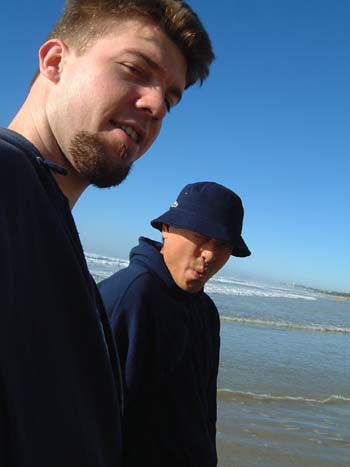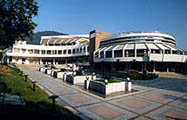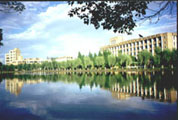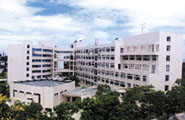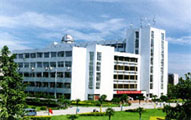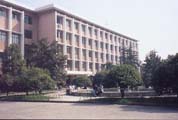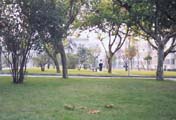09
Jul 2003Back
OK, so I’m back. It’s good to be back. Australia was awesome, but I didn’t enjoy being so poor for the last few days. I left the country with $1.20 Australian, and not because I went on a mad shopping spree before I left. But now I’m in China, where money is plentiful again.
As some of you know, countries outside the U.S. don’t use real money. It’s not even green. Instead they use colorful “monopoly money” which can actually be exchanged for goods and services just like real money. Australia’s bills are garishly colored plastic, and dollars are cleverly disguised coins. In China the big bill gets to be pink. I enjoy using this monopoly money and playing the game both in China and Australia, but I just have a lot more of it in China.
Regardless of my monetary limitations, I had a blast in Australia. I really have to thank Ben, without whom my trip would have been impossible. He and his girlfriend Kristy put Wilson and me up in Brisbane and were wonderful hosts, even driving us to Byron Bay (pics of this are on Ben’s site).
I forgot how many people I know here in China. Last night and this morning I was positively barraged with phone calls and SMS messages. It’s good to be back among so many friends (and potential summer employers), although it’s sad to think that I don’t know when I’ll see Ben and Kristy again, or Wilson, for that matter.
I have begun my summer job. It looks like other positions may be in the works, as well as lots of Chinese lessons. I’m getting special tutoring this summer from one of the teachers where I’ll study come fall so I can place higher in my Chinese class and learn more.
OK, that’s all the boring updates you’ll get out of me for now. I just hate seeing my blog stale for so long. And so my focus once again turns to China…
21
Jun 2003John in Oz
I’ll be in Australia for the next two weeks, so I won’t be updating for that time. Australia’s a big country, so I won’t try for more than a few places of interest in Queensland. For the time I’m in Brisbane, I’ll be staying with Ben, a friend and former ZUCC teacher. Wilson is meeting me at the Brisbane airport. He’s already been in Sydney for over a week.
In the meantime, you may want to check out some of the new blogs in the China Blog List. Brad F’s new blog kind of reminds me of mine. I especially like his “answers” entry.
When I get back to Hangzhou, I’ll be just teaching about 15 hours a week and hanging out, hopefully studying some Chinese in preparation for fulltime Chinese class come fall. Derrick will also be here in Hangzhou for about a month. I might be able to make it to Beijing this August, and possibly to the wedding in Kyoto of the oldest son of my Japanese homestay family. If I do that, it’ll be a boat ride from Shanghai to Osaka. Could be cool. At the end of August I’ll be busy helping the new additions to the ZUCC foreign teacher crew get settled. It’s gonna be a great new semester.
OK, I need to sleep. I leave Hangzhou for Pudong Airport at 7:30am…
20
Jun 2003Fighting Pollution
It’s no secret that “clean air standards” are not real high in China. Some people complain of sore throats when they first come to China, just because of air pollution alone. Dust is no longer that distant, mysterious substance that accumulates in remote places afer several weeks. Oh, you become very familiar with dust here. I find myself not opening the window at times for “fresh air” because fresh air also means fresh dust. Dust accumulates fast here.
So the air quality is pretty bad here, by Western standards. Hanghzou air is not as bad as some places (such as Beijing), but it’s also not the “pristine garden city at one with nature” that it would have you believe. That said, don’t let your imagination go completely wild on you. I mean, if the air quality was really intolerably bad I wouldn’t still be here. One reason I’m here in Hangzhou is that the air quality is pretty good, relatively.
Now to my story. ZUCC is located at the north end of town, in a newly created school zone. Unfortunately, the north edge of town was formerly designated an industrial zone. (That means factories are officially allowed to pollute even more out here.) You can see smokestacks to the north of our campus. Usually the pollution doesn’t really seem any worse here than anywhere else in the city, but around the end of April/beginning of May, those smokestacks went to town. In the afternoon we frequently saw lots of thick smoke pouring out of the smokestacks, sometimes even accompanied by a raging flame atop the smokestack. Naturally, a lot of people at ZUCC became concerned.
The school made a formal complaint but was worried that it was being completely ignored, as pollution is often treated as business as usual here. Hangzhou, however, is a popular tourist destination with a reputation for natural beauty, so it has a little more to lose if the pollution gets out of hand. Still, as ZUCC “foreign teacher liaison,” I decided to act on my own with regards to this issue. Sometimes foreigners’ voices can have a special impact here. I wrote a polite letter to the mayor of Hangzhou requesting that actions be taken. 13 foreign teachers from ZUCC added their signatures to mine. The letter I wrote is below:
> I am a foreign teacher of English at Zhejiang University City College, located on East Zhongshan Road in Hangzhou . In writing this letter I represent a small community of foreigners from New Zealand, Australia, Singapore, Hong Kong, Japan, and the United States, all of whom are living and teaching here.
> I write to you out of concern for my health, the health of my colleagues, and, indeed, the health of all those around me. In the past several months (April, May 2003) we have all witnessed incidents of thick smoke emitted from the smokestacks of factories to the north of our campus. Sometimes the smoke is accompanied by a large orange flame, other times it is smoke alone. When the factories emit this smoke, the air around our school becomes hazier and heavier, and a bad smell of burning permeates the area. We have photographed said smoke emissions and include the photograph with this letter. [see picture above.]
> In addition to health concerns, we also feel that this pollution will harm the development of Zhejiang University City College in that foreign visitors will be given a very poor impression of the school when such heavy pollution is evident so close to the school grounds.
> We know that China is working hard at developing its industry, but we believe that this is a serious case of air pollution that cannot be ignored. Our health, as well as the health of all the Chinese students and citizens around us, is at risk. We humbly ask that the government please take actions to curb such blatant air pollution in this area, and that it inform us of what actions have been taken.
> Thank you very much.
It may seem silly and futile to write this letter. More than one teacher who signed felt that it would do absolutely no good, but signed anyway. That’s why it’s amazing that only a month later, I learned of the actions taken by the government.
As the author of the letter, I was invited to a meeting at ZUCC along with the college vice president of general affairs and director of human resources, a regional and a municipal representative from the Chinese Bureau of Environmental Protection, the municipal foreign affairs representative, and several representatives of the factory in question. What went down is basically this.
1. Everyone got introduced.
2. Everyone got tea.
3. The Chinese EPA guy explained that during the month that the incident in question occurred, the factory actually exceeded its emissions limit and failed its inspection for the first time. As a result, it is being forced to buy and install 1,500,000 RMB (about US$183,000) particle filtering equipment. Non-compliance will result in stiff fines.
4. An account of the history of the factory was given. It is the forging plant for a motor manufacturer. It has already moved once. Hangzhou’s industrial section is being moved to the south, across the Qiantang River toward Xiaoshan, so it’ll probably have to follow suit, although this factory is not technically completely under Hangzhou’s jurisdiction.
5. Kind person gives John a simpler Chinese verion of what was just said, as it was really long and complicated with difficult vocabulary, and the guy giving it had horrible putonghua.
6. Tea refills.
7. John is asked to say something. John expresses his appreciation and pleasant surprise at having been promptly and seriously responded to.
8. Our school’s VP gave an impassioned plea for that factory to please get the hell out of here.
9. The factory spoke in its defense, saying zero pollution was impossible, the factory had a right to exist, and there was nowhere good for it to go right now.
10. A few other random pollution issues were discussed.
11. The mayor’s foreign relations representative stressed that the mayor takes environmental issues as well as foreign relations issues very seriously, and that our letter was translated and acted upon immediately after it was received.
12. The EPA guy stressed that Hangzhou takes environmental issues very seriously, and that the matter will continue to be investigated, with proper actions taken. EPA guy also passed out his card and gave us the number for a 24-hour pollution report hotline, adding that anything reported would be investigated within 30 minutes of the call.
13. Meeting adjourned, in less than an hour!
So, basically I’m surprised that such prompt action was taken. Were the actions sincere? Will anything change? That’s hard to say. But I’d say if serious actions were really to be taken, then the meeting I attended would probably be a part of it. I have hope.
12
Jun 2003Who is Chinese?
“Who is Chinese?” This is what I wrote on the board for my class last night. The Chinese concept of what exactly it is to be “Chinese” is really interesting. Speaking to Chinese people, you can’t help but come into contact with the issue. Over a year ago, Wilson and I were co-teaching American Society and Culture to English majors. Once I asked the class, “is Wilson Chinese?” NO! was the emphatic reply. A few even went so far as to assert that Wilson is “more American” than me. (This is to say that Wilson, the quintessential Californian, better fit their Hollywood image of what an American “should” be.)
This example aside, however, I find that Chinese people tend to be rather inclusive when deciding who is “Chinese.” I mean “inclusive” in that they often include people in this “Chinese” group that a Westerner might not expect would be included. (This contrasts sharply with the Japanese island mentality, in that not only can outsiders never be “Japanese,” but even the Japanese themselves cease to be real “Japanese” if they’re away for too long.) The Chinese tend to regard people of Chinese descent as “Chinese” even if they speak no Chinese in any form and have spent no time at all in China. Interestingly, it seems that this generous bestowment of Chineseness can be revoked when actual experience with the “Chinese” people in question comes into play. [See Flying Chair for a recent entry along similar lines.]
So after writing “Who is Chinese?” on the board, I proceeded to ask my class a series of questions. It’s significant to note that Wilson taught my class one time (for 2 1/2 hours). Here’s a paraphrase of the ensuing dialogue.
Me: All of you are Chinese. But who else is Chinese? Is Wilson Chinese?
[Some confusion ensues. I force them to vote. The result is about 6:2 against.] Me: Why isn’t he Chinese?
Student: He’s American. He doesn’t speak fluent Chinese, and he doesn’t have the same culture as us.
Me: Oh, I see. So language and culture are the most important. So I guess DaShan is Chinese then?
[Laughter] Student: Of course not! He can never be Chinese!
Me: Why not? He speaks fluent Chinese and he understands your culture. I think he might even have Chinese citizenship.
Student: But he doesn’t have Chinese blood!
Me: Oh, I see, Chinese blood is also important. So how about Fei Xiang [a famous half-Chinese half-white star] then? Is he Chinese?
[More confusion. A vote once again shows a split.] Me: Why isn’t he Chinese? He speaks fluent Chinese, he understands your culture, and he has Chinese blood.
Student: But he only has half Chinese blood.
Me: OK, so what if Fei Xiang had a child with a Chinese woman and they lived in China. Would that child be Chinese?
[Those who had said no to Fei Xiang appear a bit confused, but one student is adamant.] Student: No!
Me: OK, what about a person who is 7/8 Chinese? Is that person Chinese?
Student: No!
Me: OK, how about 31/32 Chinese?
[The other students are laughing.] Student: No, he’s not pure Chinese!
Me: Not even 1,048,575/1,048,576???
[More laughter. The one student is thinking. The point is finally sinking in.] Me: Do you think your Chinese heritage is that pure? If even one of your ancestors wasn’t 100% Chinese, then neither are you.
[I proceed to draw a tree illustrating how many people are involved.] Me: Do you really think any of you are that Chinese?
[Lots of head scratching.]
Oh yes, I love my job.
11
Jun 2003Mysteries of the A/C
It’s hot in Hangzhou now, so I’m using the air conditioning.
One way that China and Japan differ from the U.S. is that since they don’t have central air/heating, you have these little wall-mounted units that only affect one room, and they each have their own remote controls. This is convenient, I suppose, but the problem is that my A/C units often don’t read the remote control’s signal. I often have to press the button quite a few times — getting closer to the unit with every push, all the while pointing the remote directly at the sensor — to get it to work.
This isn’t a big deal, except that when you change the thermostat you never know if it really registered, because the remote registers the change in a little digital readout window regardless of whether home base received the transmission. I thought these things were supposed to give off a little beep as a “roger, we read you,” but mine never does except for when it’s turned on or off. Alas, I am in a perpetual state of agonizing room temperature uncertainty.
When I first arrived in Asia, I found the lack of central heating/air barbaric. This particularly applied to winter in Japan and summer in Hangzhou. Now, however, I can appreciate that in China I can be nice and comfortable in my air-conditioned bedroom while my other room is still sweltering. In the USA the whole house would have to be air-conditioned, and that’s a major waste of power when I’m home alone, just sitting in front of the computer.
(NOTE: If you’re really bored, check out the website of my air conditioner’s manufacturer, Midea. It’s completely ridiculous in its extravagance. Keep in mind that it’s just a home appliance company. You can even see my wall-mounted A/C unit in 3D glory! The Chinese really overuse Flash and other plugin apps.)
09
Jun 2003Hotel Zhoushan Dong Lu
The main road that runs by Zhejiang University City College is East Zhoushan Road, or “Zhoushan Dong Lu,” as the natives call it. Along this road are quite a few colleges in a comparatively small space. There’s also Shuren University, and the Broadcast/Journalism School (I really don’t know what the English name is — I usually refer to it as the “fine girl school”), and some others. The road is packed with small restaurants, (legit) barber shops*, convenience stores, and other small businesses that appeal to Chinese college students.
It is on Zhoushan Dong Lu that I regularly meet with my tutee, as my school is still being ridiculously strict about who comes and goes from its premises, despite the fact that SARS is not at all a serious threat in Hangzhou anymore. The place that we meet is a small bakery/cafe. We chose it because it’s bright and the drinks are cheap. We can get 2-3 rmb drinks and have our 2-hour session there, no problem. The sleepy staff couldn’t care less.
Anyway, because our usual spot is right in the cafe window, we have a great view of the endless student parade that ambles up and down Zhoushan Dong Lu. It just so happens that the cafe we chose is right next door to a little hotel. This hotel is special for two reasons. One, it’s the closest off-campus hotel to ZUCC. Two, it offers hourly rates.
Don’t get me wrong, this is no redlight district-type hotel. In the two hours that we chat at our table in the cafe, we see all kinds of people going in and out. Many are families. But college-aged couples clearly make up a sizeable chunk of the hotel’s clientele. I know because I’ve seen quite a few either entering or leaving. Some of my former students would probably be pretty mortified to know that I have seen them go in there at around 3pm on a Sunday afternoon with their boyfriends.
But then again, maybe not.
I think in the West, we would imagine that the Chinese are rather conservative, about sex especially. This is certainly not completely wrong, even if such broad generalizations are invalid by default. Still, with modernization and globalization, Chinese society is becoming more and more “open,” as the Chinese like to say. They mean “open” in a good way, in that they can accept new ideas and ways of doing things. They also mean “open” as in “promiscuous.” I would say that Shanghai, in its flashy modernity, is definitely leading the Chinese surge in “openness,” but Beijing and the rest of developed eastern China is trying hard to keep up. Each successive generation pushes the limit a little more.
So I was thinking about the Chinese college students going to hotels on Zhoushan Dong Lu, and comparing this to American college students’ behavior. Maybe a smaller proportion of Chinese college students are sexually active (I really have no idea what the statistics are), but the Chinese students are doing something kind of noteworthy. In the USA, privacy abounds, and intimate meetings are so easy to arrange. If students share a room, there’s usually only one roommate, who can’t be there all the time. It’s a simple matter for the girl to go to the guys dorm, as well as vice versa. A lot of American college students have apartments, which offer pretty complete privacy. Furthermore, there’s absolutely nothing shameful or embarrassing about the girl going over to the guy’s place to hang out. What then goes on behind closed doors is no one else’s business, and the couple can keep their relationship as private as they want to.
Now compare that to a Chinese couple making a visit to the hourly rate hotel. They can’t hang out in the dorms, really. Guys aren’t allowed in the girls’ dorms, and girls generally don’t like hanging out in the guys’ dorms because they’re typically a mess. Since dorm rooms usually house 4-8 students, it’s pretty unheard of to get any privacy at all there. Most Chinese college students don’t have their own apartments. So if they wanna do more than the typical make-out on the campus track after dark or on a bench by West Lake, these hotels are pretty much their only choice.
Even if they tend to serve a similar function, these hotels are not like Japanese “love hotels,” where anonymity is a high priority. There’s no rear entrance. When you go in, everyone on the street sees you go in, and when you come out, everyone on the street sees you come out. Some of these people might be classmates or teachers.
So the fact that college-aged Chinese couples go to these hotels in broad daylight without any sneaking around says something about just how conservative modern Chinese are.
It’s funny, though… in class they all pretend to be such wide-eyed innocents whenever sex comes up.
It’s never quite as simple as “conservative” or “open,” and I don’t pretend to have done more than just barely scratch the surface here…
* “non-legit barbershops” being the ones full of young women in tight clothes that do all their business after dark and don’t actually cut any hair
09
Jun 2003Messenger Plus! = EVIL
OK, this is off-topic, but I consider it an important public service announcement.
 I was recently recommended Messenger Plus! (MSGPlus), a program which modifies and adds new features to MSN Messenger. The software itself is actually pretty cool. The only problem is, it also adds spyware and all kinds of annoying add-ons. The program AdAware helped me get rid of most of these, but I’m still working on the most tenacious one, the Lop.com trojan, even after uninstalling Messenger Plus!
I was recently recommended Messenger Plus! (MSGPlus), a program which modifies and adds new features to MSN Messenger. The software itself is actually pretty cool. The only problem is, it also adds spyware and all kinds of annoying add-ons. The program AdAware helped me get rid of most of these, but I’m still working on the most tenacious one, the Lop.com trojan, even after uninstalling Messenger Plus!
The MSGPlus website is very attractive, and very professional-looking. Looks can be sooo deceiving. From spywareinfo.com:
Patchou, the developer of Messenger Plus, has issued a statement regarding the complaints he’s been receiving due to his new “sponsor”. To all of the people who are saying that they won’t use his program because of lop.com, he has this to say, “I don’t want to be rude but if you boycot version 2.10.36, you’re an idiot.”
Do NOT install Messenger Plus! Hopefully Microsoft will be smart and add the unique Messenger Plus features to its MSN Messenger updates. MSN Messenger 6.0 Beta is looking better already.
07
Jun 2003Inspiration
Recently I was trying to design desktop wallpaper that would remind, encourage, and inspire me to study Chinese more. In doing so, I hit upon an amusing idea. Dashan is involved. (Unfortunately, it’s not nearly as interesting if you don’t read Chinese.) It’s a new Sinosplice original.
Anyway, check out Trash Talking Dashan!
04
Jun 2003Studying Chinese in Hangzhou
As I’ve mentioned before, lately I’ve become increasingly dissatisfied with my progress in Chinese. I think there are several reasons for this stagnation. One reason I can’t ignore is that I’ve really been having a good time here for the past year and a half, and I’ve just plain been lazy about studying. I can’t deny that. But there’s more to it than just laziness. My spoken Chinese has reached a sort of plateau. I know most of the words for everyday life. If linguistists’ estimate of 10,000 words for a basic vocabulary is correct, then I know those 10,000 words in Chinese, and I can use them fairly fluently in conversation. Remember, though, that’s a basic vocabulary; it is an accomplishment, but it’s nothing to be exceedingly proud about. I’ve gotta keep pushing. Basic conversation is no longer sufficient to help me learn the more sophisticated vocabulary I want to work on, and basic conversation doesn’t help me with reading or writing, two skill areas I’ve definitely been neglecting. My conclusion? I need to take formal classes.
Besides a simple desire for further progress, there’s another reason I want to start taking formal classes. I’ve decided that I need to take the HSK (Hanyu Shuiping Kaoshi – Chinese Proficiency test, China’s “TOEFL”) in order for my progress in Chinese to be formally recognized. I didn’t major in Chinese; I just took a few courses in college, so at this point I have no official documentation to prove that my Chinese is decent. If you throw me into China it’s pretty clear that I can handle myself, but that doesn’t readily work itself onto a resume. The HSK score will provide a recognized standard that I might need for the future.
Also, I think it’s pretty clear that I thrive on competition. (Maybe that’s part of the reason I took up the study of Chinese… It’s undoubtedly quite a challenge, and there aren’t a whole lot of Westerners that can do it, so I could realistically compete with the best if I tried hard and stuck with it.) I think classroom competition in the form of other serious classmates will be a powerful form of motivation for me to excel in my studies.
I have already announced before that I plan to study Chinese at Zhejiang University for the 2003-2004 academic year. This past semester I’ve been putting aside over two-thirds of my income every month for that express purpose. Recently, though, it has come to my attention that Zheijiang University may not be the best choice for me, especially since I plan to continue living on campus at ZUCC next semester (and teaching part-time). Below is my comparison and evaluation of the three main choices for Chinese study in Hangzhou.
Zhejiang University (Yuquan Campus)
– Chinese Studies Program: Good – generally considered to be the best in Hanghzou
– Students: 500-900, from all over (but especially Korea)
– Campus: Pretty large, attractive with lots of trees, but classrooms are a little run-down
– Class Sizes: medium (20-35 students)
– Class Times: weekday mornings, beginning at 8:00am
– Commuting Distance from ZUCC: at least 30 minutes by bicycle, at least an hour by bus (requiring one transfer)
– Tuition: US$1000 for the first semester; US$800 for the second semester
– Evaluation: A decent program which perhaps charges a little too much because it knows it has the reputation of Zhejiang University behind it. It would be cool to be part of such a big international community of students, but I’m afraid the daily commute (which would necessitate me waking up at 6am for a grueling daily ordeal) would kill me.
Zhejiang University of Technology
– Chinese Studies Program: Fair – emphasizes listening and reading skills and HSK prep, but doesn’t seem to have much of a clue about conducting interesting conversation classes
– Students: about 100, mostly from Korea
– Campus: Pretty large, unattractive, classrooms are a little run-down
– Class Sizes: small (10-15 students)
– Class Times: weekday mornings, beginning at 8:55am
– Commuting Distance from ZUCC: at least 15 minutes by bicycle, at least 30 minutes by bus
– Tuition: US$780 for the first semester; US$750 for the second semester
– Evaluation: I’d prefer to study at a school with a more attractive campus, but I guess that isn’t the most important thing. The school’s reputation isn’t the greatest and the classes might not be the most imaginatively planned out, but as far as what I want to study, it should get the job done. The fact that it’s very close is a huge plus.
Hangzhou Teachers College
– Chinese Studies Program: Fair/poor – very personal interaction, but doesn’t seem to have an established study curriculum
– Students: about 30, mostly from Korea
– Campus: Pretty large, nice pond in the center of campus, some attractive architecture, but classrooms are a little run-down
– Class Sizes: very small (1-5 students)
– Class Times: weekday mornings, beginning at 8:30am
– Commuting Distance from ZUCC: at least 20 minutes by bicycle, at least 30 minutes by bus
– Tuition: US$800 for the first semester; US$800 for the second semester
– Evaluation: I really like the campus, but I don’t think the study program cuts it. First, the classes are just too small. I’m afraid I wouldn’t get the competition I’m looking for, or much of the comraderie. Second, the curriculum is just unimpressive and seems somewhat vague for advanced students.
Hangzhou University of Commerce
– Chinese Studies Program: Fair – very personal interaction, established study curriculum, but doesn’t seem to go into advanced study of Chinese (although it does offer “business Chinese”)
– Students: about 50, from all over
– Campus: Pretty large, not unattractive, but classrooms are a little run-down
– Class Sizes: small (5-10 students)
– Class Times: weekday mornings, beginning at 8:30am
– Commuting Distance from ZUCC: at least 30 minutes by bicycle, at least 30 minutes by bus
– Tuition: US$900 for the first semester; US$900 for the second semester
– Evaluation: The first thing that strikes me about the program is that to study for one year it’s the same price as Zhejiang University’s, and it doesn’t seem anywhere near as comprehensive. On the plus side, it’s closer and has smaller class sizes. I worry, though, that the program is not designed for higher level students of Chinese, because an “advanced” class is not even listed in the program description.
So, it looks like my final choice is Zhejiang University of Technology. Zhejiang University’s Chinese studies program application deadline is June 15th. I think I have to count out Zhejiang University primarily because of the commute, but it will also be nice to keep the money I save. Zhejiang University of Technology is a good compromise between convenience and excellence, and it should help me accomplish my goals. I can always re-evaluate the situation after one semester if I don’t like the program.
So, after three years of working full-time at ZUCC, I’m finally going to be a student again this fall. It feels good.
02
Jun 2003The Confucius Effect
Yes, I’m back with more fun China “facts,” based on little more than what Chinese people say! Sure, maybe it’s “unscientific” to try to make one Chinese person’s opinion be representative of 1.3 billion people… Welcome to the magic of the internet!
Anyway, I just want to share what one guy said to me today. Extremely interesting, if you ask me.
You see, I have this student that I tutor on Sundays. Normally I don’t like tutoring, because there are plenty of schools around town that will pay over 100rmb an hour for teachers, but few prospective tutees are willing to shell out that kind of cash for tutoring. Even if they are, they often want to carve up tiny little pieces of your time throughout the week to meet in a place that’s inconvenient for you. With this big SARS nuisance, though, I lost my good-paying, 3-hour-block-at-a-time, convenient part-time teaching job. I’m missing the money. Then a friend introduced a motivated young Chinese man who wants to practice speaking and is willing to come to me and pay 100 per hour. So I took it.
This guy turned out to be pretty interesting. He’s not very excitable, nor does he tell great jokes. He’s interesting for what he is. He’s a single guy in his thirties, living at home. He has a cushy government job — the kind where his “work” is to show up, drink tea, and read the paper — and he’s not satisfied. He wants more. He has decided to go to England to earn an MBA. His mother has tried to dissuade him (such a cushy job is not easy to come by!), but he’s determined. He leaves China in less than a month. I admire his drive.
His English vocabulary is also quite good, and I was very surprised to discover that he has the /th/ sound down. Very few of my English major students pronounce /th/ right, and this guy — who has no business being good at English, considering his job and how he has done literally no speaking practice since college — has got it down. Unusual.
He has also turned out to be that rare kind of student that basically just wants to talk, and actually has interesting things to say. He just needs a little nudge. So once a week, I nudge him for two hours — making corrections here and there — and listen to his opinions. Today we talked mostly about child-rearing and education.
I just want to bring in a part of our discussion about Confucius. Confucius is more famous in the West than any Chinese emperor, and he’s definitely a great man in the eyes of the Chinese as well. I asked him what he thought about Confucianism’s influence on child-rearing and education in modern China. He said that Western methods have begun to displace Confucianism. I pressed him to give me some numbers (based purely on his own judgment, of course) corresponding to the years I gave him. I wanted him to make an estimation of Confucianism’s hold on Chinese child-rearing and education as a percentage. This is what he gave me:
> 1900 – 99.9%
> 1950 – 99%
> 1970 – 99.9% (Cultural Revolution)
> 1980 – 90% (enter: Deng Xiaoping)
> 1990 – 70%
> 2000 – 50%
> 2003 – 40%
He also appended that his figures applied to “big cities,” not the whole country.
The breakdown of morality in Chinese society is an old discussion (and frequently linked to Confucianism’s waning influence), but it was interesting to see numbers applied to it (which you basically just can’t really do). According to one Chinese man’s opinion, though, Confucius’s hold on Chinese society has not only weakened, but the Confucius Effect is in the midst of a very steep dive.
28
May 2003Vacation Absurdity
In modern China, there are two national “long vacations” a year. On the academic calendar, it conveniently works out to one each semester. The length of each vacation is one week, nominally. In the Fall, it’s in celebration of the founding of the current government (国庆节), and takes place October 1st – 7th. In the Spring, it’s May 1st – 7th, beginning on May Day, the Communist “international working class holiday” (五一). This all seems well and good, but the thing is that these “week-long vacations” are something of a sham, and the Chinese don’t even realize it. (Apparently only the Western mind in its infinite wisdom can see through the treachery. Allow me to explain.)
To elucidate the issue I’ll use the ironic example of this past May Day. (It’s ironic because I, along with many other foreigners and Chinese, did not actually get a May vacation this year due to our friendly neighborhood virus SARS.) Below you will find a partial calendar containing the end of April and the begining of May, 2003. Normally, only weekends are off (these days are indicated in red).
Now, since there is a “week-long” vacation every May (always beginning on the 1st), a Westerner would rationally expect the following (days off again indicated in red):
Imagine the Westerner’s dismay, then, upon learning that in China, the above calendar can exist only in his fantasies. The actual calendar (copied from my school’s 2002-2003 academic calendar, in fact) looks like this:
Inspect it carefully, now. You’ll notice that your Western God-given Sunday, April 27th and Saturday, May 10th rest days have been senselessly revoked. Must be a mistake, right? A misprint for sure. (Clearly, you’re new here.) So you go to a Chinese co-worker or boss-type and inquire about the mysterious missing weekend days. This person nonchalantly replies, “Oh yeah, we have to work those days. Because of the vacation.” Not comprehending such nonsense, you press for clarification. “Well, we have a week of vacation, so we have to make up for it,” the person explains. But that’s a weekend! you reply. We don’t work on weekends! “Yes, but we have a week of vacation, so we have to make it up,” the Chinese person calmly replies, and goes back to work. After having several more carbon copy conversations, the facts are clear. You do have to work that Saturday and Sunday. Somehow those two weekend days are crucial compensation for the 7 days “off.”
I’ve been in China almost three years now, and it wasn’t until this year that I finally understood it. That’s not to say I agree with it, mind you, but I understand it (in much the same way that we can understand the ancient Greeks’ logic behind explaining lightning as Zeus throwing down thunderbolts to smite the naughty). I should tell how my epiphany came about.
At the end of April, a SARS meeting was held at my school. We were informed that we would not get the customary May vacation this year due to SARS. We were also reassured that since we were losing the vacation, we would end the semester early so that we wouldn’t actually be working any extra. OK, so far so good. Well, in planning my forthcoming trip to Australia at the end of this semester, the school questioned my departure date. Wasn’t that a little too early? I had classes, finals, and grades to finish. I smugly reminded them that we got to end a week earlier this semester because we had missed out on our May vacation. The response? But we only end three days early because of that.
Three days early?! Oh yes, I could feel the anger rising. We were promised (by the school president, no less) that the vacation time would be made up at the end of the semester. The explanation that was to follow made no sense to me at the time, but I didn’t really care. I was going to end my semester a week early whether they liked it or not. A few days later I finally got it when my tutor explained it to me in a way that made sense.
It goes like this. The “week off” is not actually completely given. It’s partially a rearrangement of weekend days off. The Communist government, in its benevolence, is only actually giving three days off. (Come on, now, don’t be greedy! You didn’t see Mao taking it easy on the Long March, now, did you?)
What about May 6th and 7th then?
Well, that’s where the creative rearrangement of the “gift” of weekend days off comes in. Those days are pillaged from the surrounding weekends:
Now you can see where the “three day” notion came from. But it still doesn’t really make any sense. There are still so many questions. For example…
> Q. Since the school week is 5 days long, and there are different classes on each day on both teachers’ and students’ schedules, what classes are held on the weekend “make-up days”?
> A. Well, since those work days were originally May 6th and 7th, you can follow the schedule for May 6th and 7th, respectively.
> Q. OK, great. That means out of one week “off,” two days are made up. How about the rest?
> A. Well, those are vacation days.
> Q. So when are they made up?
> A. They aren’t. They’re real vacation days.
> Q. But what if I teach the same class on both Wednesday and Thursday? Then one is made up and the other isn’t?
> A. Correct.
> Q. But then that means one of my classes gets an extra class, and puts those students ahead of the students in the other class. How do I account for that discrepancy?
> A. Well, just don’t teach anything important in the make-up class.
> Q. I don’t teach unimportant things in class! That’s not my job! Why don’t we just cancel the weekend make-up classes, then, if it’s all going to be unimportant content anyway?
> A. No, we can’t do that.
> Q. Why not??
> A. Because we have to make up the days we’re given for the vacation….
You get the idea. It’s pretty infuriating. I usually get out of the weekend classes anyhow. The really ironic part is that even though a “we must work hard” Communist work ethic reason is given for why vacation days need to be made up, the whole reason for the “week off” is purely capitalist. The week off is to encourage travel and spending, pumping big money into China’s tourism industry. That’s not a secret at all. The sad part is that the real workers — food servers, street sweepers, cab drivers, shopkeepers — get no vacation at all. They (or the business they represent) depend upon the revenue that they can earn during the vacation.
So there you have it. Vacation Absurdity. The October vacation works the same way as the May vacation.
That’s China. (But my classes end a whole week early this semester. Just because I’ve been in China for three years doesn’t mean I’ve forgotten what a vacation really is!)
24
May 2003ZUCC Chinese Student Blog
A few weeks ago in class I explained to my students what a blog is, and what a powerful force blogs are becoming on the internet. I also tried to promote blogs as a means of reaching out to the world to further international understanding (and practice language skills at the same time). I wanted to start some group student blogs. I would help them set it up, and explain how everything works. I asked anyone interested to e-mail me. Well, the response was not overwhelming. I have 7 classes, and there were only 7 interested students (plus one of my former students). Still, that’s a good number for a group blog, so we forged ahead with the project. It’s been going for over a week now, and I think these 8 students are getting the hang of blogging pretty well already. Go check it out, and don’t be shy about leaving a comment!

I don’t expect this group blog to last forever as is. Rather, it will be a continually evlolving platform for raising awareness of blogs (and their high accessibility) among my students. Furthermore, I expect the more enthusiastic new bloggers to eventually break away and form their own blogs, as some of my students have already done (Chinadoll and Mole). Hopefully there will always be new curious souls to replace those who leave the group blog.
23
May 2003她他
最近我在看Ziboy很精彩的照片的时候,偶然看了一下“miumiu”的blog。我一看到一个全是汉字的网页,一下子就想跑回去很舒服的英文网页(很懒吧!)。miumiu的网页也一样,但吸引我的是她网站的音乐!是我第一次听“徐若?u – 她他”, 感觉非常好。我一般不喜欢中国流行音乐,但它给我的悲惨感觉很经典。听了以后就想下载。下载了以后再听了几次。听了几次就想看歌词。歌词蛮动人,我很喜 欢。看了歌词以后我又去看miumiu的网站,听了更多音乐(我也喜欢Chara)。听完了以后我才去认真地看她的blog。
他他 深深爱着她
他他 永远的吗
他他 送她玫瑰花和吉他
她她 也深爱着他
她她 不变的吗
她她 收到的玫瑰花已枯萎了(已枯萎了)
他和她 爱很美 浪漫就像玫瑰花
他和她 爱很难 很小心也不一定留得住它
他和她 有时候很可怕
静静地死去它不挣扎 不说话
他他 轻轻吻着她
他他 弹着吉他
他他 最爱摸她的长头发
她她 看着那个他
她爱听他弹吉他
她寂寞的小世界被他融化(慢慢融化)
他和她 爱的melody多到挤不下
他和她 人随时也可能没有明天 不要害怕
他和她 让灵魂自由
看见爱与被爱在打架 算了吧
他和她 爱很美 浪漫就像玫瑰花
他和她 爱很难 很小心也不一定留得住它
他和她 有时候很可怕
静静地死去它不挣扎 不说话
他他送她rose and guitar
我还想问一个很无聊关于语言学的问题。中国人第一次听这首歌,如果不看歌词的话会不会完全懂哪个“ta”是“她”和哪个“ta”是“他”?
21
May 2003Voluntary Brain Rot
Any regular reader of my site knows that the regular commenters of my site tend to go off topic quite frequently. This slightly annoys a part of me, but how can I can mad when the off-topic stuff is often good stuff? For example, in my last post, “Da Xiangchang” stated:
> I’m not sure if this mass infantilization is uniquely American. I have seen nothing in China that would suggest the Chinese wouldn’t act the same way if they had the wealth and 24-hour-mass-media-saturated lifestyle Americans have.
I think that’s so true. Let me give an example. This semester (ours has another month to go) I’ve been doing a part time job teaching spoken English classes at night. Those classes have been indefinitely suspended due to SARS. The coordinator assured me, though, that after 3 weeks of no class, the classes would definitely resume this past Monday. So I showed up for class. Guess what? No students. Three showed up late, but only because one SMSed me and asked if there were classes. I told her yes. A trip in vain to the coordinator’s office and a few phone calls later, I learned what I pretty much already knew: classes were still suspended until further notice. Great.
Since we had all commuted a ways for the class, I suggested we just have some tea together and have an English/Chinese chat. They thought that was a good idea. All three of them had gone home to their respective hometowns in Zhejiang province just as the height of Hangzhou’s SARS hysteria had hit, and had recently returned to Hangzhou. I figured a good way to begin speaking English was with a fairly simple question: how had they spent their SARS vacation at home?
Their answers shocked me. They said they watched TV. Well, nothing surprising about that. But I pushed further: how many hours a day? The first student told me 12, and I was visibly startled. Every day? I asked for clarification, figuring she had misunderstood. Then she seemed a little embarrassed. No, that couldn’t be right. She did some recalculations, staring at that invisible but ever-so-helpful calculator on the ceiling, while her fingers helped keep track. No, the number was not 12, it should have been 18. Eighteen?!? I gaped. There are only 24 hours in a day! You’re telling me you spend 18 hours watching TV? That only leaves 6 hours for sleep, and no time for anything else! Yes, that’s correct, she verified. What else would she do? I suggested perhaps… reading? She laughed, thought a moment, and then confirmed — no, she hadn’t done any reading or studying.
One of the other students was less excessive, at only 10 hours a day. She also needed time to shop. The third student was down to an almost acceptably “normal” limit at 5 hours a day. But then she added that she spent about 10 hours a day online. Incredible.
I thought I spent a lot of time online, but the time I put in is nothing compared to these students’ “dedication.” The thing is, these students are not morons. They’re pretty smart, and seem fairly typical. I don’t want to suggest it, but I really think they might be somewhat representative about the current state of China’s youth. I do know that when I ask my students students in class what they plan to do in their vacation time, the most popular answer is “watch TV.” It’s frightening. The original “TV nation” is going to be beaten at its own game.
18
May 2003For many complicated reasons

For many complicated reasons that it’s best to leave him to explain, Wilson recently decided to go back to California and stay there for the rest of the year. He might come back in 2004. Who knows. He drove off today (Monday) at 9:30am in a taxi along with all the material possessions from China that he wanted to keep.
Even though he originally planned on staying only one year and he’s already finishing up his third semester, I didn’t think Wilson would really leave China. His presence has drastically changed my life here, and it’s hard to accept that that era is suddenly coming to an end. Reflecting upon this, I realize that Wilson’s presence clearly delineates the three parts of my stay in China:
1. The Self-Study Era (Pre-Wilson) (Aug 2000 – Feb 2002)
– Lived with Siyuan off campus for most of it, taught full-time
– My life was characterized by intense self-study of Chinese and Chinese practice
– Rapid progress in Chinese
– Not too much dating, partying, drinking, or associating with other foreigners
– Very few foreign teachers at ZUCC; no real “community” to speak of
2. The Golden Era (Wilson) (Feb 2002 – May 2003)
– Lived alone on campus, taught full-time
– Chinese study experienced a slow-down, socializing increased
– Progress in Chinese slowed
– More dating, partying, drinking, socializing with foreigners
– The foreign teacher community at ZUCC was really born and blossomed
– SARS marked its end
3. The Formal Study Era (Post-Wilson) (May 2003 – June 2004?)
– Expect to live alone on campus, teaching part-time
– Will be studying Chinese full-time as a foreign student at Zhejiang University
– I expect another boost in Chinese progress, vaulting well into “advanced Chinese”
– Dating, partying, drinking, and socializing with foreigners will certainly continue, but I’ll be busier
– The foreign teacher community will continue to rock on, but it will surely never be the same without Wilson’s socially catalytic presence
Certainly, Wilson’s effect on my life here was great, but it wasn’t strictly cause-effect. I didn’t study less or party more solely because Wilson was here; I put in a year and a half of hard study, and I was ready to coast for a little while on the fruits of my labor. This just happened to coincide with Wilson’s arrival. And it wasn’t that Wilson was the party animal — the sole reason the social scene picked up here. Sure, he’s a very social guy and added tremendously to the atmosphere, but when a group of friends gets along so well, the partying tends to follow naturally. Of course, Wilson was right in the middle of it, keeping it all flowing to the beat of his SF Deep House tracks.
I’m helping Wilson distribute to friends some of the stuff he couldn’t take with him. After he left, I went down to start clearing some of that stuff out. It was strange, seeing that place almost empty, when just a week ago it was oozing life and personality, exuding Wilson. It’s been more than two hours since the taxi drove off, but it hasn’t hit me that he’s gone. I expect it’ll sink in before the week is up.
ZUCC will not be the same. I guess I’d be more depressed if I weren’t sure if I’d ever see him again, but we’re meeting up in Brisbane, Australia next month. Besides, while it’s true that some people come and go in our lives, sometimes you just know when friends have become permanent.

15
May 2003SARS Media Correspondence
Recently I wrote a letter to many different media agencies using addresses I found online. (I won’t go into the spam-related ethical issues at this point…) The basic letter I sent out is below.
> To Whom It May Concern:
> I am a 25-year-old American citizen living in Hangzhou, China teaching English. I love China, and I love my life here. I find it very distressing, then, to see an abundance of hysteria- and hype-driven news stories on SARS. What I don’t understand is why the American media has not gone to one of the most authentic sources out there today – blogs. Yes, blogs (weblogs). There are many, many English-speaking foreigners living through the SARS crisis. What’s more, they are conscientiously WRITING ABOUT IT, and have been since day one. I sincerely hope that you consider adding this angle of the SARS story to your news reports.
> My China blog, Sinosplice, is at:
https://www.sinosplice.com
> I also maintain a long list of China blogs, many of which write extensively about SARS:
https://www.sinosplice.com/chinablogs.html
> The American people deserve to know a firsthand account of the truth which goes beyond hysteria.
> Thank you for understanding.
> Sincerely,
John Pasden
I received disappointingly few replies (one reporter responded apparently solely to inform me that her son is teaching in China too), but the following reply was interesting:
> Hi John,
> I’m a reporter with [a News Service] in [city], California. We are an off-beat news wire and I read how you are a proponent of blogs to tell the true story behind SARS in China. I’d like to hear more about what you have seen and how you feel they would tell the true story.
> What makes them superior than traditional media outlets? Is what is being reported inaccurate? Can you point out some mistakes the media has been making? Have you had any brushes with SARS yourself? Do other English speaking blog writers in China share your view? What are they saying about it?
> Lastly, our service provides contact information to other reporters and editors who subscribe to our news service so that they may do their own interviews with our sources. If I write an article about this subject do you mind other reporters from around the world getting in touch with you?
> Thank you for your help.
> Regards,
[Reporter Guy]
My response:
> [Reporter Guy],
> I’ll try to answer your questions as simply and directly as possible.
> I never said blogs were “superior” to traditional media outlets, but they’re certainly DIFFERENT. Sometimes the traditional media outlets sort of drop the ball, and so it’s important to remember that there are alternatives. But in some cases, what makes blogs different could possibly make them BETTER.
> We’ve all been hearing for years that a killer virus could be on the horizon for which modern science has no cure. That’s unthinkable. It’s horrific. It’s SERIOUS news. Then along comes SARS. How convenient. It’s much easier to report on SARS from the “safer” side of the Pacific, and the majority of Western investigations that I’ve read which actually go into China don’t stay for long.
> Yes, blogs are very subjective, but how subjective is going in to report with an almost predetermined conclusion? I think I trust the subjective viewpoint of someone who’s been living in China for some time, knows how things work, and at least knows what China was like BEFORE SARS.
> Hangzhou has reported very few cases of SARS. I think there really have been very few SARS cases in Hangzhou, although the government has been taking the threat extremely seriously. To my knowledge, I have not had any “near brushes” with SARS itself, but the effects have certainly reached me. My school was on lockdown* for two weeks, and remains in a state of partial lockdown**. Two of my coworkers have been quarantined in their rooms for leaving Hangzhou to go to Dalian (7 day quarantine) and Hong Kong (14 day quarantine). Even though face mask sightings have become a rarity, the city has taken on a whole new edgy feel to it. The vibrant Chinese bustle has been stifled.
> If any reporters want to get in touch with me, I’m happy to talk to them, but as I’ve said before, there are a lot of bloggers out there reporting SARS much more thoroughly than I ever care to. Their blogs are at:
https://www.sinosplice.com/chinablogs.html
> \* “lockdown” meaning no one could enter leave or leave campus without special permission.
** “partial lockdown” meaning everyone can go out, but there is a strict curfew, and only those with proper ID can enter the school.
> -John
> P.S. I’m posting this correspondence to my blog. I’ll withhold your name and organization until you give me permission to include it.
I don’t want to say anything negative prematurely, but I get the distinct impression that reporters would much rather end the “story” on China blogs about SARS with a few quotes from me, not even reading any of the China blogs in my listing.
13
May 2003短信
也许有一些中国人觉得这种笑话不好,但我觉得非常好笑。是一个学中文的美国朋友发给我的。很有意思的是前五个完全可以翻成英语,都可以用英文打出来,但第六个很有中国特色!
(.)(.) 美丽的胸部
(.Y.) 完美的胸部
(+)(+) 隆过的胸部
(o)(o) 大头的胸部
(O)(o) 不对称的胸部
(.人.) 下垂的胸部
10
May 2003A Madman's Diary

Recently I was given a really cool birthday present: Selected Stories of Lu Xun. It’s got the Chinese on the left side and the English on the right. I tend to read in English first and then go back and study the Chinese later. Lu Xun (鲁迅) is simply the most famous modern author in China. Lu Xun’s writings predate Communism by a bit, and reflect the great turbulence China was experiencing in the early 1900’s.
Anyway, the first short story in the book is A Madman’s Diary. It’s really a fascinating little piece of literature. I’ll confess, I’ve been out of the literary analysis loop for some time, and my understanding of Chinese culture and history still has a ways to go, so I didn’t fully get the story right away. It’s frustrating to have one’s intellect blunted by disuse. Still, I knew there was a lot to it. I had a talk with my tutor about the story, though. He’s a big fan of Lu Xun. So I understand and appreciate it a lot better now. [ literary analysis ]
The story deals with cannibalism. The madman narrator believes that the people of his town are plotting to kill and eat him. What’s interesting is that the story refers to the fact that China has a long history of incidents of cannibalism. Under feudalism, when hard times hit, the peasants got hit hardest. Famines were common. And, as the saying goes, desperate times call for desperate measures. One reference in the story I didn’t quite understand. It referred to the practice of “exchang[ing] sons to eat” (yi zi er shi — 易子而食). So I asked my tutor about it. I was completely shocked. In ancient China, when famine hit, there was a practice of two households exchanging a child, and then each household killing and eating that child. (You can’t eat your own child, right? That would be uncivilized.) It’s absolutely mind boggling to what extremes famine can drive human beings. My tutor told me there were also incidents of people being so hungry that they would eat mud and die from it.
It was just a little difficult to talk about this with my tutor. He answers my questions well (sometimes too well — and the guy talks fast with a really good vocabulary), and he’s committed to helping me learn more about Chinese culture. But the topic was cannibalism in Chinese history, and Chinese people have a tendency to be kind of sensitive about that which portrays China in a bad light.
I expressed total shock about the “exchange sons to eat” thing, and I think he was a little surprised. He told me he thought Western history contained incidents that are just as bad. I didn’t really doubt that, but I asked for an example. He thought for a few seconds and then brought up Roman gladiators. Not only were humans forced to battle beasts and each other in front of a live audience, but the audience actually got off on the carnage. Granted, that is pretty heinous. But the difference, I felt, was that in most cases of extreme human cruelty, the recipient is dehumanized in the eyes of the offender. It seems like that would be a little harder to do in an even exchange of children with a neighbor.
This conversation prompted me to do a bit of my own research. If cannibalism is a known part of Chinese history, I wondered just how well documented it is in English. I’m not very familiar with the scholarly resources of sinologists, so I just used Google. I found one page with information, but coming from a Japanese source it seems kind of suspect (notice that the information is even in a directory labeled “nanjing”). I also uncovered a plethora of other pages. I’m not going to list them here, because I can’t tell if those pages report the truth, or whether it’s simply some kind of sensationalist China-bashing. (If you want to see them, just do a Google search for “china cannibalism.”) I found one page debunking the claims of another page. Regardless, it’s all an information/misinformation mess, and I found very little referring to the historical incidents that I was looking for.

